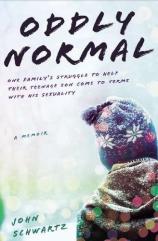Reading Group Guide
Discussion Questions
Oddly Normal: One Family’s Struggle to Help Their Teenage Son Come to Terms with His Sexuality

1. What drew you to read Oddly Normal? How did it affect your understanding of the challenges facing gay children and youth?
2. Even as a toddler, Joe liked playing with Barbies and wearing pink shoes. Do you agree with Richard Green’s “educated guess … that cross-gender behavior in boys is the age-appropriate expression of underlying homosexuality?” (p. 19)
3. During Joseph’s year in kindergarten, Jeanne put away his Barbies so he wouldn’t face ridicule from his classmates. Is it better to “edit his personality so early in the game” (p. 28) or let him risk peer rejection?
4. In addition to his budding homosexuality, Joe struggles with learning disabilities that are initially diagnosed as ADHD and his parents are pressured to put him on drugs like Ritalin. Schwartz writes, “a battle is raging over whether or not doctors overdiagnose conditions like ADHD and overprescribe drugs for it…. [But] no study I’ve found conclusively proves either side is right” (p. 36). What are your experiences with or opinion of psychoactive drugs for children?
5. Joseph’s fourth grade year was miserable from the start. When the Schwartzes ask the principal to switch Joseph to another teacher, the principal told them: “there are a number of reasons why I cannot support this” (p.75-76). If a teacher and student don’t “click,” should the school separate them, or is such a change ultimately not in the child’s best interests?
6. When Joseph was in elementary school, his parents realized “that while it’s okay for millionaire entertainers to be gay, girly little grade schoolers still have some problems” (p. 25). With the repeal of Don’t Ask, Don’t Tell and movements like Dan Savage’s It Gets Better, have things improved for “girly little grade schoolers,” or is their situation about the same?
7. Should middle school have gay-straight alliances? What share of the responsibility for educating children about sexual orientation lies with the schools? With parents?
8. After Joseph’s suicide attempt, John and Jeanne “were emotionally scourging ourselves over the missed signals and actions not taken” (p. 166). Many teens have suicidal thoughts and make self-destructive gestures. Are they a normal part of adolescence or should they always be addressed?
9. Tyler Clementi’s tragic suicide brought national attention to the prevalence of bullying and cyber-bullying. Is enough being done to curb the problem?
10. John Schwartz shares the results of a Gallup poll showing that people who view homosexuality as a biological fact rather than as a lifestyle choice are more accepting of gay marriage. Why might a story about gay penguins convince someone about the biological origins of homosexuality when a story about gay humans wouldn’t?
11. John Schwartz writes articles about same-sex marriage, but asserts that having Joe doesn’t make him biased. “I do have opinions, but all journalists have opinions. The work of a journalist is not to bleach his brain of opinions and life experiences, but to write fairly in light of all available information” (p. 209). Do you agree?
12. Schwartz describes Oddly Normal as a “chimera of a book, which is part memoir, part journalistic exploration, and part mess” (p. xiii). Did it satisfy your expectations? Who else might benefit from reading it?
Oddly Normal: One Family’s Struggle to Help Their Teenage Son Come to Terms with His Sexuality
- Publication Date: November 8, 2012
- Genres: Family, Nonfiction
- Hardcover: 304 pages
- Publisher: Gotham
- ISBN-10: 1592407285
- ISBN-13: 9781592407286







